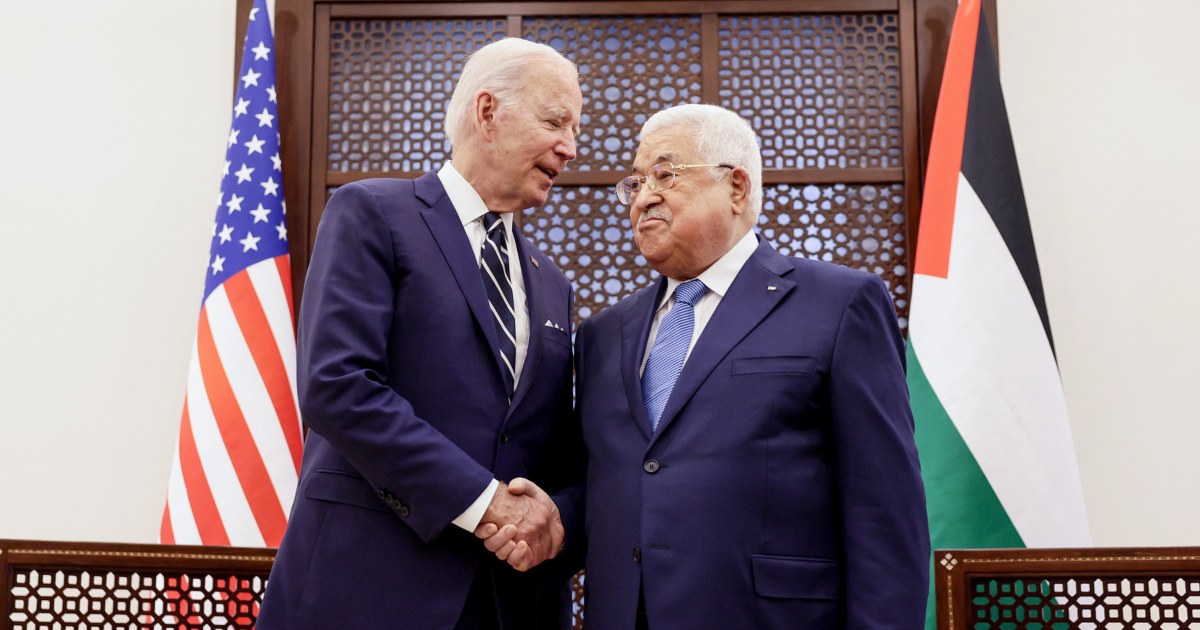
Opinion in Israel itself is divided.
A new poll released Tuesday by the Israel Democracy Institute, a Tel Aviv think tank, found 59% of Jewish Israelis opposed to the establishment of a Palestinian state as part of a deal to end the war. Among Arab Israelis, 69% support the proposal.
Some, particularly on the right, are concerned that a Palestinian state might act as a launching pad for future attacks by those militants and their supporters who openly want to eradicate Israel itself.
Israeli Prime Minister Benjamin Netanyahu himself has flatly rejected the idea, saying that a neighboring Palestinian state conflicts with Israel’s need for security — and putting him at direct loggerheads with President Joe Biden.
“The state of Israel must have security control over the entire territory,” Netanyahu said last month.
One of his security cabinet members, fellow Likud lawmaker Gideon Sa’ar, wrote Friday on X that “recognizing a Palestinian State is short-termism at its worst,” adding that such a state would “undoubtedly continue the armed struggle against Israel.”
Negative reaction among pro-Israel voices in the U.S. has been no less staunch.
“This ‘recognition’ would be even more devastating to Israel than the attacks of October 7!!” David Friedman, the hard-line U.S. ambassador to Israel under former President Donald Trump, wrote on X. Jason Greenblatt, Trump’s former Middle East envoy, wrote that recognizing a Palestinian state would “embolden Hamas and other terrorists to continue their bloody rampage.”
But those Israelis who do favor a two-state solution have been buoyed by Biden’s rekindling of a concept long since considered moribund in geopolitical conversation. “The fact that we have the leader of the free world mentioning at least twice a day the two-state solution” means the idea it’s dead is “nonsense,” Yossi Beilin, a veteran Israeli politician and peace negotiator, said in an interview last month.
And the idea has some supporters at home.
“These are important deliberations. This moment calls for bold action,” J Street, a Washington-based advocacy group that describes itself as “the political home for pro-Israel, pro-peace, pro-democracy Americans,” said last week.
In a reported column in The New York Times laying out what he describes as an emerging “Biden Doctrine,” Thomas Friedman wrote that recognition at the start rather than end of a peace process “could promote Palestinian statehood on terms consistent with Israeli security” while helping to deter Iran and shore up Biden’s support with key voting demographics ahead of his re-election campaign.
NBC News has reached out to Netanyahu’s office and the State Department for comment.
Saudi talks
There are many unanswered questions: How long will it take for the war to end so any of this can happen? How to overcome Netanyahu’s opposition? And to what extent would this depend on other moving parts in the region? On this front, the Palestinians are wary of becoming a pawn in a wider game.
“Our worry is that this whole thing could become just lip service to the interest of normalization between Saudi Arabia and Israel,” Barghouti said, referring to a deal the White House had been pursuing prior to the Hamas attack, and which may still form part of any agreement.
Secretary of State Antony Blinken met with Saudi Crown Prince Mohammed bin Salman on Monday, and they discussed achieving “an enduring end to the crisis in Gaza that provides lasting peace and security for Israelis and Palestinians alike,” according to the State Department. Blinken then headed to Egypt and Qatar before visiting Israel for his latest round of Middle East diplomacy.
The lack of Palestinian statehood is, for many observers, a central reason why this conflict has remained unresolved for decades. It leaves the Palestinians on an unequal footing to much of the world, not just when it comes to international institutions such as the U.N. but also in the global psyche, where the Palestinian territories are often not afforded the rights and respect of established nations.
In fact, what counts as a country and what doesn’t is contested. Most definitions start with the Montevideo Convention of 1933, which says that countries must have a permanent population, a defined territory and government, and must be able to enter relations with other states.
The extent to which the Palestinians fulfill this criteria is debated by scholars. But most countries do already recognize it — 139 of the 193 of U.N. member states, including most of Asia, Africa and South America. Crucially, however, the geopolitical powerhouses of the U.S., Canada and most of Europe do not. And Washington has blocked previous resolutions that would recognize a Palestinian state at the U.N. Security Council, saying it is a matter to be negotiated with Israel directly.
In 2012, “The State of Palestine” was given nonmember U.N. observer status, which brought with it the right to debate at the U.N. General Assembly, and later admission into UNESCO, the U.N.’s cultural organization, and the International Criminal Court. But it has no vote at the U.N.
Its chief blocker has been Washington, despite the fact that the U.S. has for decades officially supported the idea of a two-state solution.
In 1979, President Jimmy Carter hosted the Camp David peace talks between Israel and Egypt, part of which called for discussion on Palestinian self rule in Gaza. In 1993, President Bill Clinton hosted the signing of the Oslo Accords, a series of landmark agreements that sketched out a roadmap to peace but ultimately crashed in a blaze of mutual mistrust, blame and renewed violence.






